|
|
|
Sort Order |
|
|
|
Items / Page
|
|
|
|
|
|
|
| Srl | Item |
| 1 |
ID:
184729


|
|
|
|
|
| Summary/Abstract |
This study analyses the intricate relationship between sanction-based accountability and bureaucratic shirking. Drawing on an original survey conducted among Chinese civil servants, it addresses the question of whether sanction-based accountability can effectively regulate the conduct of public officials and provide a cure for bureaucratic shirking. The study identifies the characteristics of shirking behaviour in the Chinese bureaucracy and distinguishes three major patterns: evading responsibility, shifting responsibility and reframing responsibility. The findings indicate that sanction-based accountability may contain some obvious and notorious slacking types of behaviour, such as stalling and inaction, but government officials may distort or reframe their responsibilities to cope with accountability pressure. Empirical evidence suggests that owing to some “strategic” adjustments in bureaucratic behaviour, flagrant shirking is replaced by more subtle ways of blame avoidance, such as playing it safe or fabricating performance information. Sanction-based accountability therefore does not offer a panacea for bureaucratic shirking.
|
|
|
|
|
|
|
|
|
|
|
|
|
|
|
|
| 2 |
ID:
184715


|
|
|
|
|
| Summary/Abstract |
Survey results inflate political trust in China if the observed trust in the central government is mistaken for the latent trust in the Centre. The target of trust in the country is the Centre, which is ultimately the top leader. The critical issue domain for assessing the Centre's trustworthiness is policy implementation rather than policymaking. The Centre's trustworthiness has two dimensions: commitment to good governance and the capacity to discipline local officials. Observed trust in the central government indicates trust in the Centre's commitment, while observed trust in the local government reflects confidence in the Centre's capacity. A machine learning analysis of a national survey reveals how much conventional reading overestimates political trust. At first glance, 85 per cent of the respondents trust the central government. Upon further inspection, 18 per cent have total trust in the Centre, 34 per cent have partial trust and 33 per cent are sceptical.
|
|
|
|
|
|
|
|
|
|
|
|
|
|
|
|
| 3 |
ID:
184719
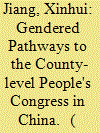

|
|
|
|
|
| Summary/Abstract |
Women are underrepresented in legislature almost worldwide, and China is no exception. Although the Chinese Communist Party (CCP) implemented its first gender quota in 1933, gender quotas and women's representation in China remain understudied. This study fills the literature gap by examining the subnational variation in gender quota implementation and women's representation in the county-level people's congresses (CPC). Through a comparison of four county-level units in Hunan and Hubei with similar socioeconomic features yet contrasting results in the numbers of female representatives elected in the 2016 CPC election, this study argues that women's access to CPCs is affected by the CCP's adoption and enforcement of grassroots quotas. The fieldwork shows that although all cases introduced a 30 per cent gender quota, only CPCs in Hunan province were able to meet the quota requirements. This was because the grassroots quota threshold was raised in Hunan and strictly enforced, partly as a response to the 2013 Hengyang vote-buying scandal. In contrast, CPCs in Hubei province nominated a large number of “first hands” (yibashou) candidates, very few of whom were women.
|
|
|
|
|
|
|
|
|
|
|
|
|
|
|
|
| 4 |
ID:
184724


|
|
|
|
|
| Summary/Abstract |
This article traces the process behind the implementation of the “Air Silk Road,” a cargo flight connection between Luxembourg and Zhengzhou, the capital of Henan province. Its origins lie in economic competition between Henan and its neighbouring provinces, dating back a decade before the official announcement of the Air Silk Road in 2017. Provincial and municipal governments in Henan displayed opportunistic risk-taking behaviour in persistently pushing for the development of Zhengzhou's airport economy, but only timing and coincidence allowed the province to gain a foothold in the Belt and Road Initiative (BRI). With findings drawn from fieldwork in China between 2019 and 2020, we contribute to an understanding of the implementation of the BRI, the underlying rationale and the challenges inland provinces face in integrating into the world economy.
|
|
|
|
|
|
|
|
|
|
|
|
|
|
|
|
| 5 |
ID:
184728
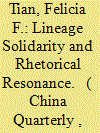

|
|
|
|
|
| Summary/Abstract |
As the state has shifted its priorities towards social harmony and poverty alleviation, this study finds rhetorical resonance, combined with strong lineage solidarity, as an emerging strategy for villages to compete for government resources and investments. By articulating grassroots needs as being in line with local cadres’ performance goals, villages have successfully converted their needs into development proposals and mobilized lineage solidarity to persuade local cadres of the feasibility of such proposals. Drawing on three villages’ school-saving efforts in Fujian province, our fieldwork illustrates how one village retained its school by mobilizing lineage solidarity and converting education into a “model” village project to boost cultural tourism. Others failed to do so and lost their schools. Under the target-based cadre management system, the bottom-up competition for government support is largely shaped by the villages’ pre-existing development and resource structures, which may maximize management efficiency but may also reinforce socioeconomic inequalities between villages.
|
|
|
|
|
|
|
|
|
|
|
|
|
|
|
|
| 6 |
ID:
184722


|
|
|
|
|
| Summary/Abstract |
How do subnational agents exercise policy discretion in the social welfare sphere? To what extent do they do so as a result of various bureaucratic and fiscal incentives? The literature has documented several explanatory frameworks in the context of China that predominantly focus on the realm of developmental policies. Owing to the salient characteristics of the social policy arena, local adaptation of centrally designed policies may operate on distinctive logics. This study synthesizes the recent scholarship on subnational social policymaking and explains the significant interregional disparities in China's de facto urban poverty line – the eligibility standard of the urban minimum livelihood guarantee scheme, or dibao. Five research hypotheses are formulated for empirical examination: fiscal power effect, population effect, fiscal dependency effect, province effect and neighbour effect. Quantitative analysis of provincial-level panel data largely endorses the hypotheses. The remarkable subnational variations in dibao standards are explained by a salient constellation of fiscal and political factors that are embedded within the country's complex intergovernmental relations and fiscal arrangements. Both a race-to-the-top and a race-to-the-bottom may be fostered by distinctive mechanisms. The unique role of provincial governments as intermediary agents within China's political apparatus is illuminated in the social policy arena.
|
|
|
|
|
|
|
|
|
|
|
|
|
|
|
|
| 7 |
ID:
184725
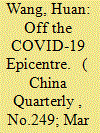

|
|
|
|
|
| Summary/Abstract |
This study documents the COVID-19 disease-control measures enacted in rural China and examines the economic and social impacts of these measures. We conducted two rounds of surveys with 726 randomly selected village informants across seven provinces. Strict disease-control measures have been universally enforced and appear to have been successful in limiting disease transmission in rural communities. The infection rate in our sample was 0.001 per cent, a rate that is near the national average outside of Hubei province. None of the villages reported any COVID-19-related deaths. For a full month during the quarantine, the rate of employment of rural workers was essentially zero. Even after the quarantine measures were lifted, nearly 70 per cent of the villagers still were unable to work owing to workplace closures. Although action has been taken to mitigate the potential negative effects, these disease-control measures might have accelerated the inequality between rural and urban households in China.
|
|
|
|
|
|
|
|
|
|
|
|
|
|
|
|
| 8 |
ID:
184720
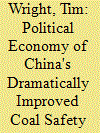

|
|
|
|
|
| Summary/Abstract |
China's coal safety has improved dramatically since 2003. This article will present the official data and conclude that it is almost impossible that the figures conceal a situation where there has not been remarkable improvement. Structural factors including China's level of economic development, changes in the labour market and the economic health of the industry have played an important role, but state commitment and policies have been central at least to the speed and magnitude of the improvement.
|
|
|
|
|
|
|
|
|
|
|
|
|
|
|
|
| 9 |
ID:
184717
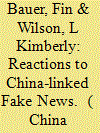

|
|
|
|
|
| Summary/Abstract |
China is accused of conducting disinformation campaigns on Taiwan's social media. Existing studies on foreign interventions in democratic societies predict that such disinformation campaigns should lead to increasing partisan polarization within Taiwan. We argue that a backlash effect, making Taiwan's citizens more united against China, is equally plausible. We conduct a survey experiment exposing participants to a real-life rumour and rebuttal to test these competing hypotheses. We find, at best, mixed evidence for polarization. Although neither rumour nor rebuttal mention China, there is consistent evidence of backlash against China. Most notably, participants across the political spectrum are more inclined to support Taiwanese independence after viewing the rumour rebuttal. These findings indicate that citizens may put aside partisanship when confronted with false news that is plausibly linked to an external actor. We conclude by discussing the broader applicability of our theory and implications for cross-Strait relations.
|
|
|
|
|
|
|
|
|
|
|
|
|
|
|
|
| 10 |
ID:
184723
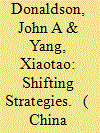

|
|
|
|
|
| Summary/Abstract |
Why do provincial governments change policy, even when those policies have proven successful? This paper explores a debate regarding the determinants of provincial policy choice and the degree of discretion provinces are permitted in this area. It does so by scrutinizing the shift in Guizhou's development policy from a poverty reduction orientation to a wholehearted pursuit of economic growth, urbanization and industrialization. In contrast to those who argue that central experience, prospects for promotion or local conditions are key factors explaining policy choice, the paper concludes that Guizhou's shift in policy had more to do with the backgrounds and experiences of top provincial leaders. The result has implications for our understanding of central–local relations and local government decision making.
|
|
|
|
|
|
|
|
|
|
|
|
|
|
|
|
| 11 |
ID:
184718


|
|
|
|
|
| Summary/Abstract |
This article explores how the Chinese government aims to maintain social stability by encouraging citizens to become volunteers. We propose that a new type of governance, namely, “state-enlisted voluntarism,” is being deployed in which public security volunteers are mobilized and monitored by the state. Analysis based on ten-year nationwide empirical data gathered from local areas in China suggests that the government intentionally enlists citizens into its hierarchical system to strengthen its administrative capacity and maintain a stable society without the risk of domestic threats. We find that direct enlistment approaches empower citizens as state proxies, and that indirect enlistment approaches ensure that various social stakeholders are comprehensively controlled. In general, the Chinese government has four reasons to institutionalize the state enlistment of voluntarism: to increase human resources at the grassroots; transform social organizations into subordinates; frame policy innovations as political credits; and to avoid blame. Our findings also suggest that China's party-state system mobilizes citizens into implementation-oriented activities rather than engages them in policymaking to maintain social stability at the grassroots.
|
|
|
|
|
|
|
|
|
|
|
|
|
|
|
|
| 12 |
ID:
184726


|
|
|
|
|
| Summary/Abstract |
This paper analyses rural migrant children's access to public schools in urban China, focusing on the implications of the recent introduction of points systems for apportioning school places. This approach, first piloted by Zhongshan city in Guangdong province from 2009, has steadily been extended nationwide. Here, we analyse the reasons for its spread and for divergence in its implementation in various urban districts. Notwithstanding rhetorical claims that points systems promote “fairness” or “equality” in the treatment of migrants, our analysis suggests that they maintain or even exacerbate the stratification of urban society, lending new legitimation to the hierarchical differentiation of entitlements. This is consistent with the aim of the 2014 “New national urbanization plan” to divert urban growth from megacities towards smaller cities. However, we argue that the use of points systems should also be seen in the context of an evolving bureaucratic-ideological project aimed at more rigorously monitoring and assessing China's entire population, invoking the logic of meritocracy for the purpose of control.
|
|
|
|
|
|
|
|
|
|
|
|
|
|
|
|
|
|
|
|
|